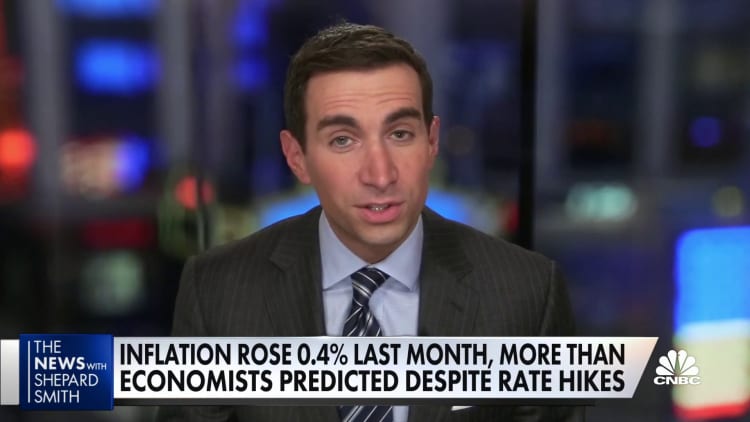How to reduce the impact of higher consumer prices due to inflation
Cavans Pictures | cavan | Getty Images
According to an estimate by Moody’s Analytics, American households are spending $445 more per month on the same items than a year ago due to inflation.
Consumer prices rose 8.2% in September from the same month in 2021, the US Bureau of Labor Statistics said on Thursday. That rate has declined from 9.1% in June, which marked its most recent high, but is still close to its highest level since the early 1980s.
Many workers’ wages have not kept pace with inflation, meaning they have lost purchasing power. Hourly wages fell an average of 3% in the year to September, after accounting for inflation, according to the BLS.
However, the impact of inflation on household wallets is not uniform. Your personal inflation rate depends on the types of goods and services you buy and other factors such as geographic location.
Regardless, it’s been a “rough time” for all households, said Ryan Sweet, chief US economist at Moody’s.
“Inflation affects people very, very differently,” Sweet said. “But everyone feels the effects.”
Moody’s Estimate of the Impact of Inflation on the Dollar analyzes the September annual inflation rate and typical household spending as described in the Consumer Expenditure Survey.
There is no silver bullet to save money
Households can take specific steps to mitigate the impact – and most likely won’t feel good, according to financial advisors.
“There is no magic bullet,” said Joseph Bert, a certified financial planner who serves as chairman and CEO of the Certified Financial Group. Based in Altamonte Springs, Fla., the company was ranked #95 on the 2022 CNBC Financial Advisor 100 list.
“It’s all these little decisions that add up at the end of the month,” Bert said.
First, it’s important to separate fixed from discretionary spending, said Madeline Maloon, a financial advisor at California Financial Advisors in San Ramon, Calif., who is ranked 27th on CNBC’s FA 100 list.
Fixed costs are, for example, expenses for essential things such as mortgage, rent, groceries, travel expenses and insurance. Examples of discretionary costs include dining out or vacations—things that people enjoy but don’t necessarily need.
There’s often less flexibility to cut fixed costs, meaning households are likely to have to make cuts on nonessential expenses if they want to save money, Maloon said.
Households may need to ask questions, Maloon added, such as: Is this new car necessary? Can I buy a used car or a cheaper model instead? Is a home remodel essential or something that can be put on hold and re-evaluated at another time?
Americans may also consider substitutions: for example, traveling to a closer location rather than a more expensive, more distant vacation destination, or staying in cheaper accommodation. Or maybe get a haircut every eight to 10 weeks instead of every six.
They can also revalue monthly subscriptions — for clothes and streaming services, for example — which can often serve as “money drains,” Maloon said. Some, while little used, continue to pull money from your account each month.
“If you continue to live the same lifestyle, you pay more for it,” Bert said.

Every purchase decision generally has an alternative, and those looking to save money should look for a cheaper option whenever possible, Bert said.
There are a few ways households can save money on their fixed expenses as well. For example, compared to grocery shopping, consumers can stock up on basic groceries, shop with a grocery list, compare stores to find the best deals, and change their eating habits.
Consumers who commute to work and spend heavily on gas, for example, may be able to cut their public transportation budgets by using a fare tracking service, paying cash, strategizing schedules, and signing up for loyalty programs.
Importantly, Americans should avoid paying for higher expenses with a credit card or through a payout or loan from a retirement plan, Bert said.
“It’s the worst thing you can do,” he added. “You will pay a high price for this in the years to come.”